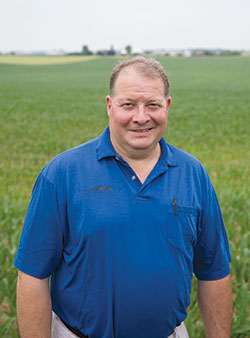The author is a partner in the Maria Stein Animal Clinic, Maria Stein, Ohio.

I just ask people what they want, go to a store that sells it, buy it, have it wrapped, and everybody is happy. I shop at brick and mortar stores from people that may be our clients but also are local 4-H leaders and little league coaches in their precious spare time.
For me, the best gifts aren’t found in stores or even on the mighty internet. My love language is “quality time.”
Finding a balance
Hal asked if we could talk about something personal as I cleaned up from herd check. I said, “Sure. We’ve only worked together for about 30 years, and we both tend to work so much that we rely on our clients and providers as friends.”
Hal said, “That’s what I want to talk about. My daughter says I work too much and don’t have work-life balance, whatever that is.”
“I get the same comment from my daughters, so some of this is generational,” I replied.
Work-life balance looks different for different people. Some of us were raised to understand that if we were alive and had work, we were balanced. Others feel that work is to be diminished because it takes away from the life they think they are entitled to.
The live-to-work group is often fraught with physical ailments and fractured relationships over time because they ignore signs that health and other people need attention. The work-to-live group may have more mental obstacles because they are looking for someone else to hold the door of opportunity open for them and it just doesn’t happen. How do we find balance between these two philosophies?
It seems that many decisions in life are determining what we don’t want. Part of the work-to-live group’s choice to not live only to work is because they have seen the destruction, especially physical but also emotional, that comes with that lifestyle. Divorce and despair are high in those that have lived to work. It is especially high when the farm that has taken a whole lifetime of inputs has not returned financial success.
It is not uncommon for millennials to appreciate their farm childhood, but they are not confident the farm lifestyle is sustainable to give that childhood to their children. They have farm-given skills that allow them to make a better living off the farm, so they do. Farming has changed, too, such that it is not easy to create a farm of value from a small holding. Generational transfers are hard if there is not enough to support two families and an internal buyout.
Sharing your talents
Hal asked, “So, what do I do?”
First, I said his daughter is an insider looking at him. She grew up driving tractor, milking cows, feeding calves, and being part of the struggle that this and most farms face. We don’t want to dismiss her observation, but I suggested Hal do a personal inventory to show himself first that he does more than just work. His list started with dairy producer, but it also included that he is a husband, son, father, grandfather, religion teacher, ag booster, volunteer firefighter, 4-H leader, and director on the board.
I looked at that list and said, “Looks like you’re pretty well balanced to me. You have a lot going on that isn’t just work.”
There is not much time for activities such as sitting around the campfire or going out on the boat. He may occasionally do those things, but most items on the list have a higher calling.
What comes up around the holidays is the challenge of running a dairy farm and having time to get together with family. We have always figured out how to exchange gifts, but have we always exchanged the most important gift — time together? That time together doesn’t always mean five days with the whole family. Some other families can do that, but they do not have the daily responsibilities that caring for livestock requires.
We may be able to slow down and include family in our chores and still count that as quality time with others. Imagine teaching your 14-year-old grandson from the city how to milk cows. Your time together may be even more special because you are able to give from time that was already committed and not from your spare time, whatever that may be.
You may be able to share with others the gift that work is rewarding. The mantra is that if you do a job you love, you don’t work a day in your life. Getting up and looking forward to what you can do that day, and then ending the day with an inventory of accomplishments, puts a positive look on your lot in life. This is a valuable lesson.
Find ways to say yes
Hal asked again, “So, what do I do?”
My response was, “You say, ‘Yes!’”
When they ask if you can come for a birthday party, you say yes. You may negotiate a bit different time for the party, or milking might get moved an hour one way or another, but say yes! If you are asked if you can watch the grandkids, say yes if it can be done safely. You build that relationship with the grandchildren that will last forever, and you’ll have a stronger relationship with your children, too. You will teach them both how fulfilling it is to accomplish your objectives for the day. You may have to be more flexible with timing and need to stop working to take their phone call, but do whatever it takes to stay connected.
The gift you have to give is the understanding that work has dignity, family and friends have value, and a healthy balance of both provides a fulfilled life. Merry Christmas, and may all your gifts be rewarding.









